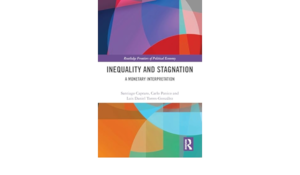Israel Has Successfully Provoked Iran To Enter War

Mireille Rebeiz – Dickinson College
10-06-24 ~ An interview with Lebanon expert Mireille Rebeiz, who says that “I would like to believe that Lebanon will not turn into a second Gaza,” but now finds itself “in the middle of a major storm.”
After nearly a year since the Hamas-led terror attack on southern Israel that resulted in the deaths of close to 1200 people (roughly 800 civilians and nearly 400 security forces though some Israeli civilians and soldiers may have been killed by friendly fire as the controversial “Hannibal Directive” was deployed on that date, according to reported testimonies of soldiers and officers), Israel’s destruction of Gaza continues unabated.
Israel has rejected calls from the international community for a ceasefire/prisoner swap deal and blatantly ignored an International Court of Justice ruling not to engage in any military offensive in Rafah where the situation in the southern Gaza city was already “disastrous.” Now, however, after having killed more than 41,000 Palestinians (though the toll could reach up to 186,000 dead according to a study published in early July in the prestigious medical journal Lancet) and making Gaza practically unlivable, Netanyahu’s neo-fascist government that makes Europe’s right-wing extremists seem like little farceurs has turned its focus to Lebanon. A joint operation between the IDF and Mossad spread terror by exploding walkie-talkies and pagers that people in Lebanon used, killing many and severely wounding thousands, while the Israeli military carried out massive airstrikes across southern Lebanon that have already killed more than 1,000 people, including many children, and wounded thousands.
Airstrikes have killed scores of senior Hezbollah figures, including its long-time leader, Hassan Nasrallah. But the airstrikes on Lebanon did not stop even after Nasrallah’s death despite calls for de-escalation, raising fears of a regional war between Israel and Iran. The Israeli military has even targeted central Beirut, and up to one million people may have been displaced. And as even further evidence that Israel is seeking to provoke a regional war, it launched a ground offensive in the south of Lebanon where heavy fighting is apparently taking place between Israeli forces and Hezbollah fighters. Indeed, Iran seems now to have been dragged into a regional war by launching a major missile attack on Israel.
What is Israel after in Lebanon? Has Nasrallah’s death altered the direction of the conflict? Are we on the brink of a full-blown war in the Middle East? In the interview that follows, Mireille Rebeiz, a Lebanon and Hezbollah expert tackles these and other related questions. Rebeiz is Chair of Middle East Studies and Associate Professor of Francophone Studies & Women’s, Gender and Sexuality Studies at Dickinson College (Pennsylvania). Read more
Interview With Economists Santiago Capraro, Carlo Panico & Luis Daniel Torres-Gonzàles On The Causes Of Inequality
 09-26-2024 ~ Economic inequality is one of the most pressing issues of our times. Inequality has pernicious effects on individuals and society at large. It causes a wide range of health and social problems, from reduced life expectancy and lower social mobility to violence and mental illness. Economic inequality erodes societal cohesion and fuels support for authoritarian leaders. But what is driving inequality in the contemporary world? A recently published book, titled Inequality and Stagnation: A Monetary Interpretation, and co-authored by academic economists Santiago Capraro, Carlo Panico and Luis Daniel Torres-Gonzàles, attributes rising inequality to the outgrowth of the financial sector. In the interview that follows, Santiago Capraro, Carlo Panico and Luis Daniel Torres-Gonzàles make the case for an economic approach that, in their own view, offers the best explanatory framework for understanding the driving forces behind inequality.
09-26-2024 ~ Economic inequality is one of the most pressing issues of our times. Inequality has pernicious effects on individuals and society at large. It causes a wide range of health and social problems, from reduced life expectancy and lower social mobility to violence and mental illness. Economic inequality erodes societal cohesion and fuels support for authoritarian leaders. But what is driving inequality in the contemporary world? A recently published book, titled Inequality and Stagnation: A Monetary Interpretation, and co-authored by academic economists Santiago Capraro, Carlo Panico and Luis Daniel Torres-Gonzàles, attributes rising inequality to the outgrowth of the financial sector. In the interview that follows, Santiago Capraro, Carlo Panico and Luis Daniel Torres-Gonzàles make the case for an economic approach that, in their own view, offers the best explanatory framework for understanding the driving forces behind inequality.
J. Polychroniou: Income and wealth inequality has risen sharply since the 1980s in most advanced economies around the world and has been blamed for many of the social ills facing capitalist societies in the 21st century. Economic inequality is also particularly problematic in most emerging and developing economies–and there is little evidence to suggest that this is due to less redistributive pressures in the developing world than there are in advanced liberal democracies. Indeed, in your new book titled Inequality and Stagnation: A Monetary Interpretation, it is argued that the cause of inequality, along with the sluggish growth of recent decades, is the outgrowth of the financial sector. In your view, how did the changing character of the financial system following the collapse of the Bretton Woods system lead to rising inequality and sluggish growth?
Caprano, Panico & Torres-Gonzàlez: Our book addresses theoretical, historical, and institutional issues, deriving from the writings of Keynes and Sraffa a Classical-Keynesian approach that focuses on the interactions between political arrangements, distributional variables, and the level of output and growth. This approach is used to argue that the outgrowth of the financial sector is the main cause of low growth and rising inequality observed during the last decades.
The Classical-Keynesian approach denies that money is neutral in long-period analysis, i.e. denies the absence of persistent monetary influence on the levels of growth and distribution. It highlights that monetary factors and the institutional organization and conduct of economic policy play a key role in affecting the path of the economy, offering the following interpretation of recent events.
After the abandonment of the Bretton Woods Agreements, financial regulation shifted from an approach based on the discretionary powers of the authorities over the managers of financial firms to one based on fixed rules, such as capital requirements. The pressures of the financial sector on the political world favored this change that led to the transformation of the specialized system, which forces financial companies to operate in a single type of activity, into a universal one, which allows them to operate in multiple businesses, such as credit intermediation, capital market operations and insurance.
The new approach to regulation has allowed for the introduction of a wide range of financial innovations and has made speculative activity predominant over the funding of production and international trade. As a result, the sector has grown at higher rates than the rest of the economy and has increased its degree of concentration and its ability to obtain legislation favorable to its interests. Read more
The Left Wins Presidential Election In Sri Lanka
 09-25-2024 ~ On September 22, 2024, the Sri Lankan election authority announced that Anura Kumara Dissanayake of the Janatha Vimukthi Peramuna (JVP)-led National People’s Power (NPP) alliance won the presidential election. Dissanayake, who has been the leader of the left-wing JVP since 2014, defeated 37 other candidates, including the incumbent president Ranil Wickremesinghe of the United National Party (UNP) and his closest challenger Sajith Premadasa of the Samagi Jana Balawegaya. The traditional parties that dominated Sri Lankan politics—such as the Sri Lanka Podujana Peramuna (SLPP) and the UNP—are now on the back foot. However, they dominate the Sri Lankan Parliament (the SLPP has 145 out of 225 seats, while the UNP has one seat). Dissanayake’s JVP only has three seats in the Parliament.
09-25-2024 ~ On September 22, 2024, the Sri Lankan election authority announced that Anura Kumara Dissanayake of the Janatha Vimukthi Peramuna (JVP)-led National People’s Power (NPP) alliance won the presidential election. Dissanayake, who has been the leader of the left-wing JVP since 2014, defeated 37 other candidates, including the incumbent president Ranil Wickremesinghe of the United National Party (UNP) and his closest challenger Sajith Premadasa of the Samagi Jana Balawegaya. The traditional parties that dominated Sri Lankan politics—such as the Sri Lanka Podujana Peramuna (SLPP) and the UNP—are now on the back foot. However, they dominate the Sri Lankan Parliament (the SLPP has 145 out of 225 seats, while the UNP has one seat). Dissanayake’s JVP only has three seats in the Parliament.
Dissanayake’s triumph to become the country’s ninth president is significant. It is the first time that a party from the country’s Marxist tradition has won a presidential election. Dissanayake, born in 1968 and known by his initials of AKD, comes from a working-class background in north-central Sri Lanka, far from the capital city of Colombo. His worldview has been shaped by his leadership of Sri Lanka’s student movement, and by his role as a cadre in the JVP. In 2004, Dissanayake went to Parliament when the JVP entered an alliance with Chandrika Kumaratunga, the president of the country from 1994 to 2005 and the daughter of the first female prime minister in the world (Sirimavo Bandaranaike). Dissanayake became the Minister of Agriculture, Land, and Livestock in Kumaratunga’s cabinet, a position that allowed him to display his competence as an administrator and to engage the public in a debate around agrarian reform (which will likely be an issue he will take up as president). An attempt at the presidency in 2019 ended unsuccessfully, but it did not stop either Dissanayake or the NPP.
Economic Turbulence
In 2022, Colombo—Sri Lanka’s capital city—was convulsed by the Aragalaya(protests) that culminated in a takeover of the presidential palace and the hasty departure of President Gotabaya Rajapaksa. What motivated these protests was the rapid decline of economic possibilities for the population, which faced shortages of essential goods, including food, fuel, and medicines. Sri Lanka defaulted on its foreign debt and went into bankruptcy. Rather than generate an outcome that would satisfy the protests, Wickremesinghe, with his neoliberal and pro-Western orientation, seized the presidency to complete Rajapaksa’s six-year term that began in 2019. Read more
Noam Chomsky: The Persistent Prompt Out Of Propaganda Bubbles

Noam Chomsky
09-23-2024 ~ In June 2024 I was listening to Noam Chomsky (recorded) trying to make sense with extremely good poise to a Times journalist to think outside western propaganda bubble.
In 2023 and 2024 I have listened to him responding to the polemic-interviews like that of Times as well as the more independent, alternate or amateur media. I get transported in time back to the 1999-2000 when I listened to the voice for the first time, except for the fact that now I was listening to a mind in his mid-nineties. This was, the opposite of the fast fatalistic human beings who often surround us with their system conservative spiritualisms, not a mind that aged chronologically and hence finds solace in a time they froze at, nor was this an unprovocative mind to whom the demagogues could find consensus.
When an interviewer asked polemically in 2023 whether he thought, after all these years, he was wrong on occasions, Noam peacefully replied “many times”. And then he went on to say that he was for example wrong to get later that he should have in the opposition movement to the US led war on Vietnam. This from a human being in his mid-nineties is nothing short of sheer hope. It increases the spectrum of possibilities, whether or not one uses it. I know that after the massive stroke he had in 2023, Noam may not speak his mind out again. But I heard that expressions rise in him when he listens to the ongoing wars on Palestine and violence on life. That is the most a brain can be in a life time I suppose.
Personally, the new, profound and disruptive voice I first heard in a documentary by the end of 90s, have transformed to an insistent voice of hope. Video cassettes that were played in old VCR machines of the day that brought out often flickering images and analogue tape VHS output has long gone. I sense somewhere along the days I have also lost much of my ability to listen, though audio-visual hours have statistically increased in the digital-now.
Noam’s academic trajectories in the domain of linguistics, morphophonemic (s), generative grammar, syntactic structures or mathematical linguistics, are of course archipelagos far away for me. I have been caught in the crossfires of the more informed agreements and disagreements about those worlds, but in my comfortable ignorance. On the other hand, Manufacturing Consent: Noam Chomsky and the Media, the 1992 documentary, brought home by a friend as a video cassette recording, left a great imprint. I had never imagined Media through the sieves of elite groups, propaganda or the unwillingness to portray certain events coupled with the added emphasis on others. Read more
Forests Thrive When Indigenous People Have Legal Stewardship Of Their Land
 09-18-2024 ~ The fate of intact forests is closely linked to that of Indigenous peoples.
09-18-2024 ~ The fate of intact forests is closely linked to that of Indigenous peoples.
Forests are essential for life on Earth. Because they produce oxygen and help regulate the balance of carbon dioxide and oxygen in the atmosphere, forests are known as the “lungs of the Earth.”
For millions of local and Indigenous people, forests are also homes, hunting grounds, and traditional cultural and ceremonial spaces. These communities have been caring for forests for countless generations because doing so ensured their survival and the preservation of their societies. Yet, despite scientific evidence showing that recognizing Indigenous land rights is crucial to stopping deforestation, governments and corporations often fail to do so.
Carbon Sinks
Trees and forests are among the world’s best carbon capture technologies. Excess carbon is stored in trees’ trunks, roots, and surrounding soil. On average, global forests annually absorb 7.6 billion metric tons of carbon dioxide, or about 1.5 times the emissions of the United States.
Deforestation removes these essential carbon sinks, increasing the amount of greenhouse gases in the atmosphere. According to the Environmental Defense Fund, tropical forest destruction contributes around 20 percent of annual anthropogenic carbon dioxide emissions.
Beyond functioning as carbon sinks, forests are essential to environmental health, providing invaluable ecosystem services to human and nonhuman animals. These services include preventing soil erosion, improving water quality, assisting watershed development, and creating a barrier against strong winds, heavy rain, and flooding.
Healthy forests also foster biodiversity. Although they cover only 31 percent of the globe, “they are home to more than 80 percent of all terrestrial species of animals, plants, and insects,” points out the United Nations Sustainable Development Goals. Read more
Why Celebrities, Actors, Writers, And Artists Fear AI

Leslie Alan Horvitz
Photo: lesliehorvitz.com
09-15-2024 ~ Artificial intelligence can steal your likeness, mannerisms, voice, and creative work. Can anything be done about it?
With online access, you can easily tap into the powerful world of artificial intelligence (AI). By using Google’s AI chatbot, Gemini, or Microsoft’s Copilot, people can use AI to supplement or replace traditional web searches. OpenAI’s ChatGPT—the generative AI that’s become all the rage—can create a sci-fi novel or an innovative computer code and even diagnose a patient’s condition—produced in mere minutes in response to a human prompt.
Using a text-to-image program like DALL-E, a person can create an image of a unicorn walking along a busy city street. If they don’t like it, another prompt will tweak it for them or add another pictorial element.
But who owns this computer-generated content? Answering that question becomes tricky when the prompt includes the likeness or voice of someone other than the user. While regulators, legislators, and the courts are grappling with questions about the use and application of AI, they need to catch up, particularly on the issue of copyright.
“There’s a video out there promoting some dental plan with an AI version of me,” the actor Tom Hanks lamented in October 2023. “I have nothing to do with it.” He isn’t the only one facing these issues. Actress Scarlett Johansson also found that her voice and likeness were used in a 22-second online ad on X (formerly known as Twitter).
Don’t be taken in by singer Taylor Swift “endorsing” and giving away free Le Creuset Dutch ovens to Swifties—her fans. While Swift has said that she likes Le Creuset cookware, she isn’t doing ads for the brand. This and many other AI-generated fake ads use celebrity likenesses and voices to scam people. These include country singer Luke Combs’ promotion of weight loss gummies, journalist Gayle King’s video about weight loss products, and another fake video featuring the influencer Jimmy Donaldson (known to his followers as MrBeast).
A casual listener might have mistaken the song “Heart on My Sleeve” as a duet between the famous rap artist Drake and the equally famous singer The Weeknd. But the song, released in 2023 and credited to Ghostwriter, was never composed or sung by Drake or The Weeknd. There are several instances where the voices of singers were generated using AI. For example, an AI-generated version of Johnny Cash singing a Taylor Swift song went viral online in 2023.
This raises questions about who the rightful owners of these products are, considering that they are in whole or in part produced by AI. And what rights do Tom Hanks, Scarlett Johansson, Taylor Swift, and Drake have over their likeness and voices that were used without their permission? Do they have any rights at all? Read more


